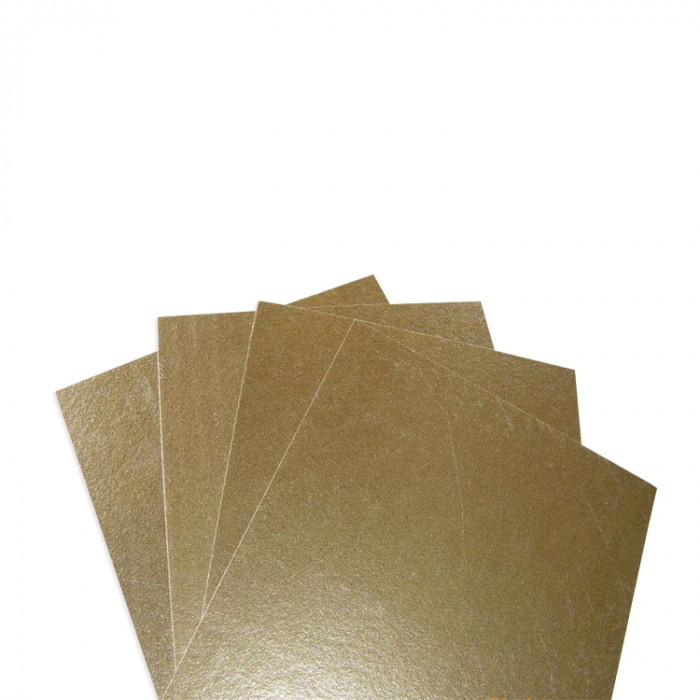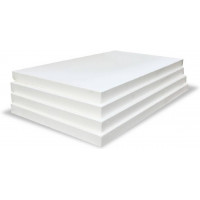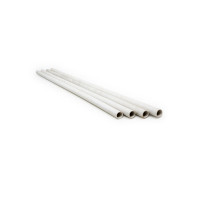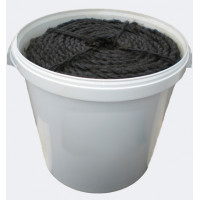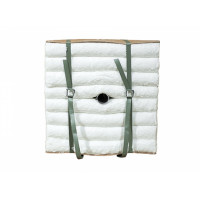Mikanit spacer PFG 550x900x0.15 mm is a sheet electrical insulating mica-containing material; organosilicon varnish is used as a binder.
Scope of application: groove insulation of electrical machines, parts of complex configurations and machines of heat resistance classes F and H; groove insulation of armature and stator sections of low-voltage electrical machines.
Micanite is a sheet or flexible material obtained by gluing sheets of plucked mica. Bonding is carried out using special resins or resin-based varnishes. Mica sheets are laid out on the table and sprayed with an adhesive substance. Next, a subsequent layer is applied, which is also treated with resin or varnish. The gluing process continues until the sheet reaches the desired thickness.
Modern production of micanite blanks is mechanized. Each type of micanite is indicated by a specific marking. The first letter of the marking indicates the type of material, which can be manifold, spacer, molding or flexible. The second letter indicates the type of mica used (muscovite, phlogopite or a combination of both). The third letter indicates the type of resin used to glue the material together. After all the indicated designations, the letter A may be written at the end of the marking, indicating a reduced amount of resin substance. For example, PMG material contains up to 20% resin, and PMGA – up to 12% resin. Mikanite is used to insulate individual elements of electrical equipment; it is also widely used as an insulating layer for industrial heaters. Some types of electric heaters may consist only of a heating element and micanite mica without a protective shell.
Collector micanite is made from sheet solid material by resin gluing. Double pressing is carried out at a pressure of 180 -260 kg/cm2. The temperature during pressing is 155 degrees. After pressing, the sheets are milled. Next, the finished product is varnished and pressed again to obtain a dense monolithic structure.
Collector micanite acts as an insulating gasket and is used to protect copper plates in electrical machines. In this insulation, the sheets should not slide, and the binder material should not leak out under a temperature load of 160°C and a pressure of 600 kg/cm2. For materials of the KFG, KFGS, KFSh brands, the shrinkage should not be higher than 2%, and for KFA - more than 1%. This requirement is necessary to maintain the strength of the collectors. Based on this, the binder should not be introduced into micanite by more than 4%. The final crimping of micanite ensures tight contact of the gasket with the collector plates. The density of the finished collector material is 0.44 -1.5 mm. Size no less than 215-465 mm.
Micanite gasket is a hard sheet material. It is made by gluing together plucked sheets of mica, after which it can be pressed. Shellac, glypthal or organosilicon resin can be used as a binding element. The cushioning micanite contains up to 95% mica. Binder – 20-5% of the total composition. Pressing is applied only once. Temperature treatment during pressing 150 degrees. The specific pressure at the time of pressing is 35-60 kg/cm2. Sheet dimensions – 550 by 650 mm, density from 0.15 to 5 mm. Gasket micanite is used as a pectro-insulating gasket for various electrical devices.
Molding micanite is a loose sheet insulator. It is made by gluing together plucked mica with glyphthal. Organosilicon and shellac resins can also be used for gluing. Pressing is carried out once at a pressure of 5-MO kg/cm2. Pressing temperature 155 degrees. Can be manufactured with complex shapes. The composition of mica in this micanite is about 95%, resin can contain from 20 to 5%. At room temperature the material is not flexible. When heated, it can take any shape. The leaf density is 0.1-1.5 mm.
When added to the composition, muscovite mica is characterized by increased values of electrical properties. In this case, the density of the material will be from 0.154 to 0.25 mm.
Flexible micanite is also produced in sheet form. Muscovite or phlogopite can be used as the base material. The adhesive is oil-based varnish. It can be produced either pressed or unpressed.
In order to improve the strength characteristics, some brands of flexible micanite are covered with micanite paper on both sides. The density of the manufactured material is 0.15-0.5 mm.
The composition of mica in uncoated micanite can be equal to 75-90%. The remaining percentage is filled with a binder varnish. Micanite laminated contains 0t 50% to 65% mica, binder - 25-10%, everything else is mica. Flexible micanites are widely used as slot, interturn and shroud insulators, as well as electrical insulating gaskets. After production, flexible micanite does not lose its bending properties for two months.
Fiberglass, which is also flexible, differs from ordinary flexibleIt is made of micanite in that it is glued with alkali-free fiberglass. This sizing can be applied on one or both sides at the same time. At the same time, the material’s strength increases and its flexibility increases. Resistant to high-temperature heating, micanite is glued together with an organosilicon compound. The rest of its types are treated with epoxy-polyester varnish. The main material is phlogopite mica. The flexible glass-miconite contains 45-65% mica, 30-8% adhesive, the rest of the composition is filled with fiberglass. The density of the material can range from 0.20 to 0.60 mm.
If micanite contains shellac or glypthal resin, it can work for a long time at temperatures up to 130°C. With a polyester or epoxy resin composition, micanite can withstand temperatures up to 155°C for a long time.
With an organosilicon binder, any micanite material can work for a long time at a temperature load of 180°C.
Where are mikanites used depending on their design?
Composite materials obtained as a result of automatic or manual gluing are used to form insulation in conductive processes in a small local location and over a large area.
Clamp type. Suitable for devices made of metal and plastic. The design is characterized by the uniformity of thermal energy removal and the duration of the period of use. The operating temperature range does not exceed +500˚С, permissible short-term thermal surges reach +700…+900˚С. Good for wrapping around nozzles, small shapes and small cylindrical areas.
Flat type. Made to order, they provide tight coverage on smooth, curved surfaces. They are evenly in contact with the insulated part of the equipment and are used at boundary temperatures of +350…+500˚С.
Heaters with body parts made of micanite. They require careful handling due to reduced mechanical strength. Suitable for cases when thermal insulation of a limited-size equipment segment is needed.
Micanite heaters are needed in generators, electric motors, transformers, and induction furnaces. They distribute heat evenly without creating peak areas of thermal overload.
What are the features of mikanites
Retains a continuous structure after gluing.
They do not deteriorate during operation, preserving the original characteristics.
The material can be given different configurations.
They have a low coefficient of water absorption, so they are used in dry and damp rooms.
Different thicknesses are used to create the required insulation layer.
The material is stable over the entire area: the edges prevent crumbling, they are so securely fastened with polymer.
The percentage of mica varies depending on the type of insulation produced and ranges from 69-90%.
Despite the rather thin layers, the strength against bending load reaches 200 MPa.
From us you can buy Mikanit spacer PFG 550x900x0.15 mm at the best price in Ukraine. A wide range of products allows us to quickly and efficiently fulfill any order, helping to complete any construction work on time.
No questions about this product, be the first and ask your question.

